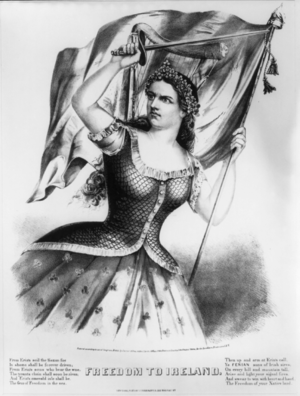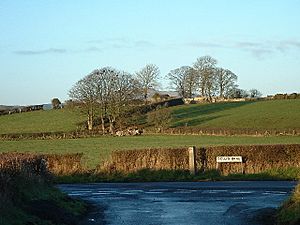Party Processions Act facts for kids

|
|
| Long title | An Act to restrain Party Processions in Ireland. |
|---|---|
| Citation | 13 & 14 Vict. c. 2 |
| Territorial extent | England and Wales |
| Dates | |
| Royal assent | 12 March 1850 |
|
Status: Repealed
|
|

The Party Processions Act (13 & 14 Vict c2) was a law passed in 1850 by the Parliament of the United Kingdom. This law stopped certain public marches and gatherings in Ireland. It was created to prevent groups from causing trouble after a big fight known as the Dolly's Brae in 1849.
The Act was written to stop people from "assembling and marching together in procession in Ireland in a manner calculated to create and perpetuate animosities between different classes of Her Majesty's Subjects, and to endanger the public peace." This means it aimed to stop arguments between different groups of people and keep the peace. Actions like using certain flags, symbols, or playing music that could cause anger were against the rules. Breaking this law was considered a minor offense.
Sir Robert Peel strongly supported the Act. However, other politicians, like Lord Claude Hamilton, disagreed. They argued that peaceful religious parades would also be stopped, even if they posed no threat. Another law, the Party Emblems Act, was passed in 1860 to support this measure after more unrest in Derrymacash.
Groups like the Orangemen accepted the Act, but not happily. Other groups, such as the Irish Republican Brotherhood, the Young Ireland movement, and Fenian groups, were much less pleased. William Johnston of Ballykilbeg led a group of Orangemen who openly defied the Act in the 1860s. He was sent to prison for this. His imprisonment led to strong calls for the law to be removed in 1867, which finally happened in 1872.
Some historians see the creation and removal of this Act as an important moment for Irish nationalism. They view it as an example of the "English" government trying to control Ireland. However, others, like Peel, believed the Act was needed to prevent fights between Catholic and Protestant groups, not to suppress Irish nationalism as a whole. Historians still debate the Act's true purpose today.
Why Was the Act Needed?
The Party Processions Act was created because of a serious event called Dolly's Brae. On July 12, 1849, Orangemen marched from Rathfriland to Tollymore Park in County Down, Ireland. They were celebrating the anniversary of the Battle of Boyne. This battle was where William of Orange defeated the Catholic King James II of England.
As the Orangemen passed through Magheramayo, a mostly Catholic area, they exchanged shots with a group called the Ribbonmen. The Ribbonmen were a Catholic Irish independence movement. After this, the Orangemen attacked Catholic homes in the town. About 30 Catholic people were killed. This sad event became known as Dolly's Brae.
In the years before this, Ireland had been facing a lot of trouble. The Great Famine had caused a huge drop in Ireland's population. Many anti-Union groups felt the British government handled the famine poorly. At the same time, new laws were giving more rights to Catholics, which made some Irish Protestants feel left out.
Protestant Orangemen often held large parades with banners, music, and flags. These parades sometimes promoted anti-Catholic ideas. The British government worried about these events. So, a bill to "restrain party processions in Ireland" was proposed on February 8, 1850. It was discussed in the House of Commons and then approved by the House of Lords.
What Did the Act Say?
The Party Processions Act was officially called "A Bill to Restrain Party Processions in Ireland." It stated that:
"Many people in Ireland have been gathering and marching in ways that cause and keep alive bad feelings between different groups of Her Majesty's subjects, and that put public peace at risk. Therefore, the Queen, with the advice of the Lords and Commons in Parliament, declares that from now on, all gatherings of people in Ireland who meet and parade together or join in a procession, and who carry any firearms or other weapons, or any banner, symbol, flag, or sign that might cause anger between different groups, or who are joined by anyone playing music that might cause anger between different groups, will be illegal gatherings. Anyone present at such a gathering will be guilty of a minor offense and will be punished."
William Johnston of Ballykilbeg was sent to prison in the 1860s for breaking the Party Processions Act. On July 12, 1867, several Orangemen celebrating the Battle of Boyne were told they would be charged under the Act. This made them well-known in local news.
In 1864, a large rally was held to remember Daniel O'Connell, who had passed away in 1849. This rally included banners, flags, and songs that were against the Act. This led to discussions in Parliament in February 1865. Lord Hamilton claimed that 60,000 to 80,000 people had marched in parades that broke the Act's rules. However, he said these marches did not cause any trouble. Peel replied that the law was made to stop conflict between Catholic and Protestant groups. He insisted it did not stop peaceful marches.
By 1867, Johnston's imprisonment led to strong demands for the Act and its related Emblems Act to be removed. The Party Processions Act was finally repealed, or cancelled, in 1872.
 | George Robert Carruthers |
 | Patricia Bath |
 | Jan Ernst Matzeliger |
 | Alexander Miles |


